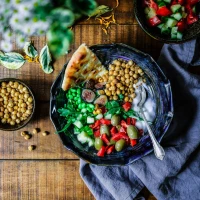In today’s fast-paced world, where convenience and processed foods dominate our diets, there is a growing desire to return to the basics and savor the natural flavors of fresh, organic food. More and more people are becoming conscious of the impact their food choices have on their health and the environment. This has led to a rise in sustainable farming practices and an increased demand for organic food.
In this article, we will explore the concept of sustainable farming and its benefits, as well as provide a collection of 43+ delicious organic food recipes that showcase the freshness and quality of ingredients straight from sustainable farms.
The Concept of Sustainable Farming
Sustainable farming, also known as regenerative farming or organic farming, is an agricultural system that aims to cultivate crops and raise livestock without the use of synthetic additives, pesticides, or genetically modified organisms (GMOs). Instead, it focuses on holistic management practices that prioritize soil health, biodiversity, and long-term environmental sustainability.
Benefits of Sustainable Farming
- Improved Food Quality: Organic food is often perceived as being fresher, tastier, and more nutritious than conventionally grown produce. This is because sustainable farming practices promote healthy soil, which in turn leads to nutrient-rich crops that are packed with flavor and essential vitamins and minerals.
- Environmental Conservation: Sustainable farming practices reduce the reliance on harmful chemicals and promote biodiversity. By avoiding synthetic pesticides, herbicides, and fertilizers, organic farmers help protect the soil, water, and air from pollution, as well as support habitats for beneficial insects, birds, and wildlife.
- Health Benefits: Consuming organic food reduces exposure to potentially harmful chemicals found in conventional agriculture. Studies have shown that organic food contains lower levels of pesticide residues, antibiotics, and hormones, which may have adverse effects on human health.
- Supporting Local Economies: Sustainable farming practices often prioritize local food systems and support small-scale farmers. By choosing organic, locally produced food, consumers contribute to the growth of their local economies and help create a more resilient and sustainable food system.
Farm-to-Table: Savor the Freshness
The farm-to-table movement, also known as farm-to-fork or farm-to-plate, encapsulates the idea of enjoying food that is sourced locally and sustainably. By connecting consumers directly to the source of their food, whether it’s a nearby farm or a community-supported agriculture (CSA) program, individuals can have a more intimate understanding of where their food comes from and how it is produced.
Organic Food Recipes Straight from Sustainable Farms
Here are 43+ organic food recipes that celebrate the freshness and sustainability of ingredients:
-
Mixed Greens Salad with Citrus Dressing
- Ingredients:
- Organic mixed salad greens
- Orange segments
- Grapefruit segments
- Pistachios
- Citrus dressing (orange juice, lemon juice, olive oil, honey, salt)
- Instructions:
- In a large bowl, combine the mixed salad greens, orange segments, grapefruit segments, and pistachios.
- In a separate bowl, whisk together orange juice, lemon juice, olive oil, honey, and salt to make the citrus dressing.
- Drizzle the citrus dressing over the salad and toss gently to combine. Serve immediately.
- Ingredients:
-
Roasted Organic Vegetables
- Ingredients:
- Organic carrots
- Organic potatoes
- Organic beets
- Organic onions
- Olive oil
- Salt and pepper
- Instructions:
- Preheat the oven to 400°F (200°C).
- Peel and chop the organic carrots, potatoes, beets, and onions into bite-sized pieces.
- Place the vegetables on a baking sheet and drizzle with olive oil. Season with salt and pepper.
- Roast in the oven for 30-40 minutes until the vegetables are tender and golden brown. Serve as a side dish or as a main course with a protein of your choice.
- Ingredients:
-
Grilled Organic Chicken with Fresh Herbs
- Ingredients:
- Organic chicken breast
- Fresh herbs (rosemary, thyme, parsley)
- Garlic cloves
- Olive oil
- Salt and pepper
- Instructions:
- Preheat the grill to medium-high heat.
- Season the organic chicken breast with salt and pepper.
- In a small bowl, combine chopped fresh herbs, minced garlic cloves, and olive oil to make a marinade.
- Coat the chicken breast with the herb marinade and let it sit for at least 30 minutes.
- Grill the chicken breast for 6-8 minutes per side until the internal temperature reaches 165°F (74°C). Let it rest for a few minutes before serving.
- Ingredients:
-
Quinoa-Stuffed Bell Peppers
- Ingredients:
- Organic bell peppers
- Cooked quinoa
- Organic black beans
- Organic corn kernels
- Diced tomatoes
- Chopped onion
- Garlic powder
- Cumin
- Paprika
- Salt and pepper
- Instructions:
- Preheat the oven to 375°F (190°C).
- Cut the tops off the organic bell peppers and remove the seeds and membranes.
- In a large bowl, mix cooked quinoa, organic black beans, organic corn kernels, diced tomatoes, chopped onion, garlic powder, cumin, paprika, salt, and pepper.
- Fill each bell pepper with the quinoa mixture and place them upright in a baking dish.
- Bake for 25-30 minutes until the bell peppers are tender and the filling is heated through. Serve as a flavorful and nutritious main course.
- Ingredients:
-
Homemade Organic Tomato Sauce
- Ingredients:
- Organic tomatoes
- Chopped onion
- Minced garlic
- Olive oil
- Dried basil
- Dried oregano
- Salt and pepper
- Instructions:
- Bring a large pot of water to a boil. Score a small “X” on the bottom of each organic tomato and blanch them in the boiling water for 30 seconds. Remove the tomatoes and transfer them to an ice bath to cool. Peel off the skin and chop the tomatoes.
- In a large saucepan, heat olive oil over medium heat. Add chopped onion and minced garlic and sauté until translucent.
- Add the chopped tomatoes, dried basil, dried oregano, salt, and pepper to the saucepan. Simmer for 30-40 minutes until the sauce has thickened. Adjust the seasoning to taste.
- Use the homemade organic tomato sauce as a base for pasta dishes, pizzas, or as a dipping sauce for bread.
- Ingredients:
These are just a few examples of the many delicious organic food recipes you can create using fresh ingredients sourced from sustainable farms. The possibilities are endless, and the flavors are unmatched.
Sustainable Food Shopping Tips
When it comes to sourcing organic, sustainable food, here are some tips to keep in mind:
- Shop Local: Visit farmers’ markets or join a CSA program to support local farmers and access the freshest organic produce available in your area.
- Read Labels: Look for certifications such as USDA Organic, which ensure that the food you’re buying meets specific organic standards.
- Choose Seasonal: Opt for fruits and vegetables that are in season to enjoy the full flavors and nutritional value of fresh produce.
- Grow Your Own: If space permits, try growing your own organic herbs, vegetables, or fruits at home. This allows you to have complete control over the cultivation process while reducing food miles.
- Reduce Waste: Plan your meals ahead, buy in bulk where possible, and compost food scraps to minimize waste and support a circular economy.
Conclusion
Savoring the freshness of organic food sourced from sustainable farms not only delights the taste buds but also contributes to a healthier and more environmentally conscious lifestyle. By choosing organic, you support local farmers, promote biodiversity, and reduce the use of harmful chemicals in the food production system. So, why not explore the world of organic cooking and enjoy the abundance of flavors nature has to offer?
Please note that the recipes provided are for inspiration and can be customized to suit personal preferences and dietary restrictions. Always ensure the organic origin of the ingredients and follow proper food safety guidelines when handling and preparing food.










